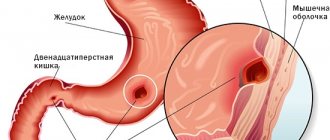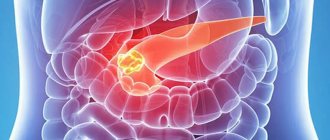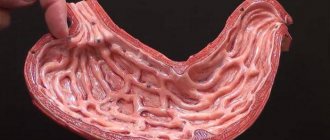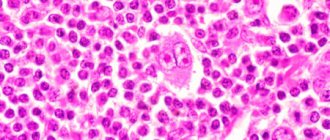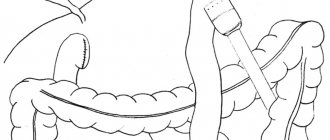- home
- Gastroenterology
- Treatment of gastritis of the stomach
- Treatment of chronic gastritis of the stomach
Chronic gastritis is a sluggish inflammation of the gastric mucosa, which over a long period of time provokes irreversible changes in the functioning of the digestive organ. In most cases, the origin of the disease is infectious. Treatment of chronic gastritis is extremely necessary in order to avoid such serious complications as the formation of peptic ulcers.
Forms and complications of gastritis
In the absence of adequate and timely treatment, gastritis can cause complications. These include:
- Stomach ulcer. Peptic ulcers affecting the mucous membrane of the stomach or duodenum. Peptic ulcer disease is provoked by excessive use of painkillers (NSAIDs), and gastritis caused by H. pylori. It is difficult to say where gastritis ends, especially with erosions, and peptic ulcer disease begins. Apparently these are different forms of the same process.
- Atrophy of the gastric mucosa - atrophic gastritis. It occurs due to thinning of the mucous membrane, the formation of fibrosis (microscars) of the membrane during chronic gastritis. With atrophy, the number of active cells in the gastric mucosa that produce enzymes and acid decreases. The absorption of some vitamins is impaired. Atrophic gastritis is a risk factor for oncological transformation and therefore requires special attention.
- Gastric bleeding with erosive gastritis and ulcers. It is characterized by shortness of breath, weakness, dizziness, blood in the vomit and stool, black stools, and pale skin. If these symptoms occur, you should immediately seek medical help.
- Anemia. Most often it occurs due to acute (as described above) or chronic blood loss, for example, with multiple repeated erosions of the stomach. Research suggests that H. pylori-associated gastritis and autoimmune gastritis can affect the body's absorption of iron and vitamin B12 from food, which can also cause anemia.
- Vitamin B12 deficiency and pernicious anemia (pernicious anemia). Autoimmune gastritis does not produce a certain protein that helps absorb vitamin B12, which is necessary for the production of red blood cells and nerve cells. Insufficient absorption of vitamin B12 can lead to the development of pernicious anemia. The same changes occur in the advanced stage of atrophic gastritis of any origin.
- Stomach cancer. Chronic gastritis increases the likelihood of developing benign or malignant neoplasms in the gastric mucosa. For example, gastritis associated with H. pylory increases the risk of adenocarcinoma and lymphoma of the gastric mucosa.
Symptoms and treatment of chronic gastritis
Symptoms and treatment of chronic gastritis in adults are always individual, since each patient has his own clinical picture of the disease. The key factor influencing the further course of therapy is how long the patient has not sought medical help, what lifestyle he leads and what events preceded the development of digestive pathology.
Signs of the disease:
- an increase in body temperature to 37 degrees or higher, but the patient has no signs of a cold or acute respiratory viral infection;
- aching pain in the central part of the abdomen with a shift to the chest;
- the pain syndrome always worsens after eating spicy, hot, smoked, sour, or too rough food;
- burping often begins for no reason and does not stop for several hours;
- periodically there is a disorder of the stool, both in the direction of prolonged constipation and in the form of diarrhea;
- during an exacerbation of chronic gastritis, a sour taste appears in the mouth, indicating that the acid concentration of gastric juice has been exceeded to a critical level.
If you notice these symptoms, you should immediately seek help from our clinic specialists. We will conduct a thorough examination of the digestive system, determine the cause of the disease and prescribe appropriate treatment.
Causes and risk factors of gastritis
- Bacterial infection Helicobacter pylori. It is one of the most common types of infections and is transmitted through the fecal-oral route, for example through contaminated food and water. For the development of gastritis, the presence of Helicobacter pylori infection alone is not enough. It is believed that vulnerability to the bacterium is inherited or occurs due to an unhealthy lifestyle (smoking, poor diet), medications.
- Painkillers (non-steroidal anti-inflammatory drugs, NSAIDs). Regular and excessive use of aspirin, ibuprofen or naproxen can cause both acute and chronic gastritis, their toxic effects reduce the production of the main protectors of the gastric mucosa. To distinguish this situation from other types of gastritis, it is called NSAID gastropathy.
- Alcohol. Irritates and gradually destroys the gastric mucosa, exposing it to the aggressive effects of gastric juice. Alcohol most often provokes acute gastritis.
- Age. Older people are at increased risk of developing gastritis because the lining of the stomach thins with age. Older people are also most vulnerable to infections (H. pylori) or autoimmune disorders.
- Stress. Severe stress associated with injuries, burns, severe operations and infections can trigger acute gastritis.
- Exposure to radiation or radiation therapy (due to another medical condition).
- Bile reflux after gastric resection.
- Allergies to foods such as cow's milk and soy (especially in children).
- Autoimmune diseases. As a result of autoimmune processes, the body produces antibodies that attack the cells that form the gastric mucosa. Autoimmune inflammation occurs, and the functions of the protective barrier of the mucous membrane decrease. Gastritis associated with autoimmune disorders is called autoimmune gastritis. It is more common in people with other autoimmune disorders, including Hashimoto's disease and type 1 diabetes. Autoimmune gastritis may also be associated with vitamin B12 deficiency.
- Other diseases. The risk of gastritis may be increased by other medical conditions, including Crohn's disease, sarcoidosis, parasitic infections, and HIV/AIDS.
Stages of gastritis
- Hyperemia. At the first stage of gastritis development, hyperemia (redness) of the gastric mucosa is observed. This is a protective vegetative-vascular reaction - dilation of blood vessels and increased blood flow in response to a negative effect on the mucous membrane. Hyperemia is accompanied by edema, this is a sign of the development of inflammation.
- Chronic inflammation, metaplasia, dysplasia. The production of hydrochloric acid decreases, the mucous membrane thickens. Hypertrophy is typical for people who abuse alcohol. Inflammation is characterized by the accumulation of leukocytes in the stomach wall; prolonged inflammation can change the structure of the gastric epithelium, it can become similar to intestinal epithelium, this phenomenon is called metaplasia and may be associated with an increased risk of cancer. But the risk is especially high if a biopsy reveals a violation of the structure of the tissue and cells of the stomach - dysplasia.
- Atrophy. Prolonged inflammation causes thinning of the gastric mucosa, recovery processes slow down, atrophic changes in the mucosa are observed - epithelial cells die and are replaced by scar tissue.
- Erosion and ulcers are a frequent companion to gastritis. Focal and profound changes develop due to a decrease in the performance of the mucous glands, thinning of the protective layer, in most cases this is a consequence of exposure to H. pylori.
Therapy methods
Treatment of chronic gastritis in adults consists of forming a therapeutic course, which includes medications in the following category:
- Anti-inflammatory. Designed to relieve the inflammatory process of the gastric mucosa and prevent the destruction of the epithelial tissues of the digestive organ. In the future, this will eliminate the possibility of developing peptic ulcers.
- Antibacterial. In most cases, chronic gastritis is caused by the microorganism Helicobacter pylori. If the painful condition of the stomach was caused by this infectious pathogen, then the patient is selected an antibiotic, the purpose of which is to destroy bacteria of this group.
- Reducing acidity. An increased concentration of hydrochloric acid is one of the reasons for the presence of chronic gastritis. Regular intake of suspensions that suppress the concentration of gastric juice accelerates the process of complete recovery.
Medicines are used in the form of intravenous and intramuscular injections, droppers, tablets, gels and solutions for internal use. The type of medication is determined individually after receiving diagnostic data. Treatment of exacerbation of chronic gastritis always also involves taking antispasmodics to relieve severe pain.
Treatment of gastritis
Treatment for gastritis depends on the cause. Acute gastritis caused by taking NSAIDs or alcohol abuse does not require drug therapy; it is enough to exclude these triggers.
In other cases, your doctor may recommend:
- Antibiotic therapy against H. pylori.
- Drugs that block the production of hydrochloric acid (a component of gastric juice) and promote healing of the mucous membrane (proton pump inhibitors* - omeprazole, lansoprazole, rabeprazole, esomeprazole, dexlanzoprazole, pantoprazole.
- Antacids** (neutralize stomach acid, relieve pain).
* - Long-term use of proton pump inhibitors, especially at high doses, may increase the risk of hip, wrist and spine fractures, and an osteoporosis prevention program may be required. ** - Side effects - constipation, diarrhea.
Features and advantages of the gastritis treatment method at the Rassvet clinic
Diagnosis and treatment of gastritis at the Rassvet clinic is carried out in the gastroenterology department. We use evidence-based methods based on international clinical guidelines. Your primary treatment will begin only after a physical examination and all necessary tests and diagnostic tests have been completed.
Important. The influence of certain foods or dietary systems on the risk of gastritis has not been proven by research.
At the Rassvet Clinic, we first of all distinguish gastritis from functional dyspepsia. Gastritis is often asymptomatic, but it is necessary to treat it, since it is a slow but sure road to stomach cancer. Functional dyspepsia, on the contrary, is accompanied by many complaints, but endoscopic examination and biopsy do not reveal pathology.
How gastritis is treated at the Rassvet clinic
To clarify the diagnosis, we use the most modern and accurate equipment and logistics methods. For example, we have built a system for diagnosing gastritis and determining cancer risk according to the OLGA classification. Our endoscopes allow you to perform gastroscopy with multiple magnification and examine the mucous membrane through light filters, taking a biopsy from the most suspicious areas. The biopsy samples themselves are also assessed by the histologist using the OLGA scale, and as a result we obtain a figure that reflects the risk of oncological transformation in the coming years. Further treatment tactics depend on the value of this figure.
We value the comfort of patients, so in Rassvet you can undergo an examination under anesthesia in the shortest possible time.
Recommendations from a gastroenterologist at the Rassvet clinic for patients with gastritis
Timely consultation with a doctor and proper treatment will help keep the disease under control. A strict diet is not needed. However, the rules of a healthy diet should be followed - do not overeat, avoid foods that irritate the mucous membranes (smoked, fried, fatty), and give up alcohol. If you are forced to take painkillers that increase the risk of gastritis, check whether they can be replaced with a drug that is less aggressive on the gastric mucosa (acetaminophen, paracetamol).
Gastritis does not go away
Olga, Novosibirsk
December 12, 2019
Hello, dear doctors! I have the following problem: gastritis does not go away for a long time without Helicobacter. I’ll explain step by step what happened to me: In May, a gastrointestinal disorder occurred with yellow diarrhea, abdominal discomfort and something like chills. According to the first ultrasound, diffuse changes in the pancreas, suspension in the yolk without changing its shape, it seemed that the ducts were only slightly inflamed. Some changes in the liver. The prescriptions were: phosphalugel, enterol, creon for approximately 10 days, then duspatalin and ursosan for 14 days. The enterol caused constipation and I had to stop taking it. Ursosan made me feel very bad, terrible pain in the intestines, everything was bloated, I couldn’t eat at all. I sent a coprogram: there was a little undigested muscle fiber, quite a bit of starch (+), and indigestible fiber. I passed all the blood tests. Everything is okay! Both biochemistry and general. All tests for worms are negative. At the next ultrasound, the liver returned to normal, the ducts too, but there was a suspension and changes in the pancreas. Prescriptions: ursosan for a month, duspatalin for a month and alfanormix for 7 days. After taking Alfanormix on the 4th day, my stomach just started to burn, I called an ambulance because I couldn’t even stand the pain. The appointment was cancelled, the Ursosan was cancelled. I had an FGD and it showed very slight superficial gastritis at that time. I didn’t drink anything other than Creon for 1.5 months. After alphanormix, the stool became formed. At a scheduled appointment, Odeston is prescribed for the gall bladder for 14 days, then hofitol for a month. On the third day from odeston there was a burning sensation in the stomach and a small rash broke out on the face. I'm going to the hospital. Odeston is canceled, tanacechol and a collection of choleretic herbs are prescribed. All this for 10 days. After Odeston, an ultrasound showed clear gallstones. I accept it all. Discomfort and pain in the abdomen do not go away, the stool turns green. After all this treatment, severe pain begins to ache on the left under the ribs and in the middle in the epigastric zone. They can’t figure out the cause for a long time and write it off as pancreatitis. I drink Creon and go on a strict diet. The pain doesn't go away. Then they prescribe Nolpaza, de Nol. Nolpaza 40 mg 2 times a day. De Nol 2 tablets twice a day. It gets much better. I’ve been undergoing treatment for a month and a half and already think I’m cured. I am starting a gradual withdrawal of medications. And on the third day after stopping Nolpaza, the pain increases so much that on the seventh I run to an FGDS. There are acute erosions along it in the antrum and near it. The mucous membrane is clearly hyperemic. Acidity 1.5. The doctors are shocked... they shrug their shoulders and don’t understand how this can happen. Superficial reflux has been added (the lower part of the esophagus is slightly inflamed). Prescriptions: rabeprazole in any form 20 mg once a day for 2 weeks, then 10 mg for another 2 weeks and diet. I follow everything, the pain does not completely go away. I’m going to see how the gall bladder works. With a trial ultrasound breakfast. In 40 minutes the reduction is 42%, gyromotor dyskinesia is diagnosed. Cholenzyme is prescribed. It generally upsets the stool and turns yellow. A couple of days of diarrhea once a day. Then it formed, but remained yellow. It doesn't get much easier in two weeks. I'm going to see a gastroenterologist again. She prescribes Pariet 20 mg 2 times a day for 2 weeks, then 20 mg 1 time a day for 2 weeks. And he refers me to a neurologist regarding the functioning of the gall bladder, since he sees no organic reason for the failure of its work. It is of normal shape, there are no seals, everything is fine. Just a weak contraction and thick bile. He says not to take choleretic drugs, apparently they cause reflux. The pain does not go away within 2 weeks; Pariet is prescribed once a day, 20 mg. Alfazox and zakofalk for the intestines are added. The neurologist prescribed Teraligen. In general, after 1.5 months it is not getting any easier. The doctor says everything should have healed by now. I don't understand what is happening. What I have now: pain in the left side under the ribs, sometimes in the epigastric zone. Not always dependent on food. Afterwards he can barely feel better for a while, but there is a heaviness, then it hurts again. I’ve been on the diet for a total of 7 months now. Now, in general, it’s already very strict, because it’s impossible to expand the diet anyway. The stool is formed, yellow, sometimes porridge, but more often normal. I noticed that there were some small solid particles in it. Thank you if you all read this. I describe it in as much detail as possible to make it clear. I no longer know what to test, what to check and how to treat it. I’m very tired of fighting.. the disease interferes with normal life.
The question is closed
gastritis
burning sensation
JVP

